Maddy Proud opens up on her scary experience with serious concussion
Maddy Proud was trying not to panic. But blood kept coming and the episodes began. Nausea, hot and cold chills. This was the start of a concussion nightmare.
Netball
Don't miss out on the headlines from Netball. Followed categories will be added to My News.
Maddy Proud didn’t panic until she was lying on the cold netball court floor, fighting to stay conscious.
Moments earlier, the NSW Swifts star had been defending her teammate Nat Haythornthwaite in a fairly innocuous training drill.
She copped a shoulder to the chin, bit her tongue and suffered a bit of whiplash as her head rocked back from the collision.
“It was fine until I tasted blood in my mouth” Proud recalled.
The midcourter darted to the bench to swish water around in her mouth, but blood kept coming and the episodes began: Nausea. Hot and cold chills.
“Then the breathing started to go. You get overtaken by this panic attack, I never fully lost consciousness but wasn’t with it. I had to lie down,” Proud said.
“I was going in and out of these episodes, I would be okay for a little while, then my heart rate would fly.”
This would continue for an hour, prompting the Swifts medical team to call an ambulance - they were also concerned that whiplash may have caused Proud to injure her neck.
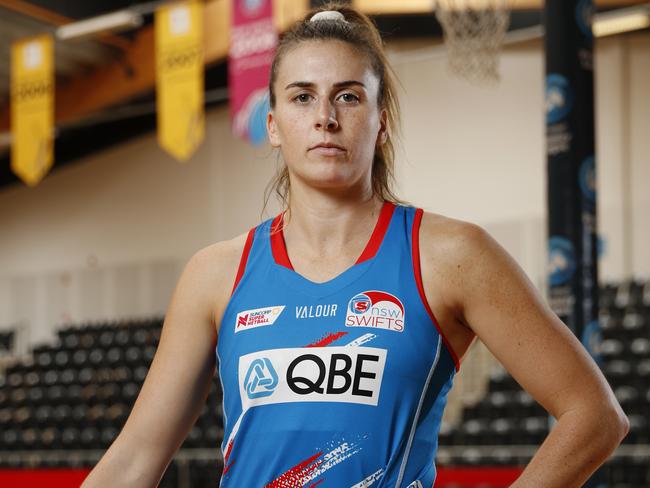
“They were supporting my head … I was lying there thinking I definitely can feel everything, but I can’t move my neck, but it‘s probably because I hadn’t moved for a while,” Proud said.
“I thought, what is going on? Is this going to keep happening, is this ever going to stop?”
Proud was stretchered off to hospital and, after 10 hours of testing and observation, she was released.
But the episodes continued the next day and the Swifts skipper didn’t feel herself again for almost a week.
“I’m such a loud and outgoing person, it was very obvious to everyone that I wasn’t right, I’d be sitting in a room in my own head … I’m never a napper, but I was tired all the time” Proud said.
The 27-year-old missed the following Super Netball match after failing the SCAT test and focused on getting her head right.
One year later, Proud doesn‘t dwell on her concussion scare during match play - largely due to the support she received from the Swifts through recovery.
But the star admitted that it creeps into her mind during some training sessions.
“It was almost frustrating, I thought, how have I got concussed doing something mundane like a practice drill when usually I’m flying everywhere on the court?” Proud said.
“There have been a few instances, even a couple of months ago, one day at training I hit my head on the ground. Normally I’d get straight back up but, because the way it’s happened in the past, I’ve had a delayed reaction …. I’m waiting for a couple of minutes to see if it’s going to come.
Now, she’s sharing her story to ensure that female athletes - from all codes - aren’t left out of the concussion conversation.
“People think how can you get concussed playing netball? Maybe they just think it’s about rugby players running at each other head on,” Proud said.
“For us, we’re spending half the game trying to run away from each other … it’s a very physical, high contact, fast game which is usually going to end up in some collision of some form. Perception around it is definitely changing.”
Leading sports doctor Adrian Cohen said that further research on women and concussion is urgently needed.
“Not only do women have a higher prevalence of concussion and concussion reporting, but they have a higher number of symptoms and those symptoms hang around for longer and are more profound” Dr Cohen said.
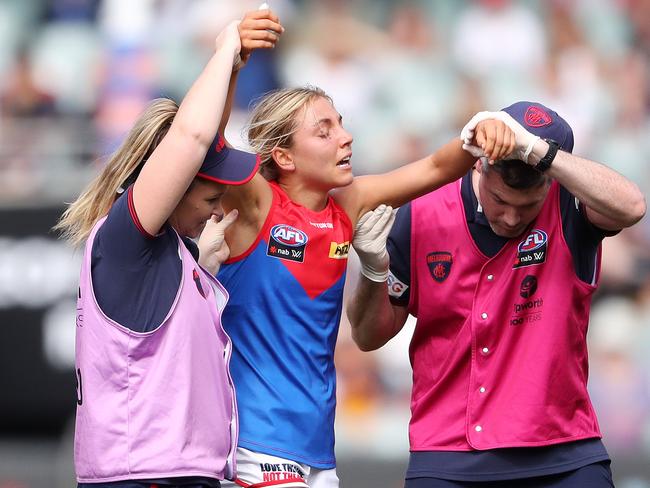
The sports doctor said that female athletes’ tendency to have weaker neck muscles - compared with their male counterparts - may make them more susceptible to concussion.
Dr Cohen also partly attributed the high concussion rates across female athletes as women are more likely to report their symptoms than men.
He also noted new evidence suggesting that female brains metabolise faster than male brains.
“With concussion, there’s an impact, there’s a decrease in blood flow, a decrease in nutrients to all the cells in the brain,” Dr Cohen said.
“One way to think about it is that (females) cells are slightly hungrier … when you have an injury disrupts supply of glucose and oxygen, it might explain why they suffer more damage.”
Ultimately, however, further research is needed to understand exactly why concussion is more common among females.
Dr Cohen called for all sports to collect thorough data on all concussions - not just those collisions that result in unconsciousness.
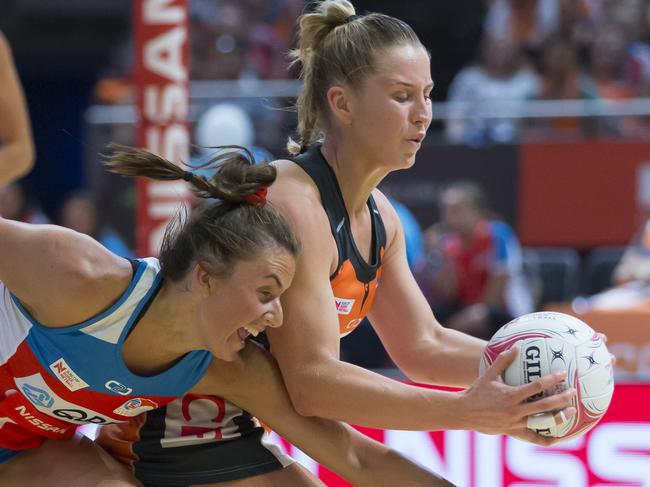
“Every concussion counts, the total number of concussions you have during your sporting career is undoubtedly a predictor as to how much you will suffer after your sporting career,” Dr Cohen said.
“Sporting codes now showcasing female athletes on television, we know that television produces money for the codes, they’ve got to look back and say the responsibility we now have is to look after these women, to understand and measure what’s going on … it gravitates down to multiple grades, below to community sports, we need a broad range initiative to actually start counting concussions.” Dr Cohen said.
“The most recent statistic we have in Australia was from a study done in 2013 in Victoria on people admitted to hospital because of concussion. Not those who had one on the field, those who reported it, or even those went to the emergency department … it was just those who got admitted.”
The sports doctor also stressed that Australia must start treating concussion as a health and productivity issue.
“After (athletes) have a concussion, they’re told that they can‘t play for a week. But we allow them to go back to work, to operate heavy equipment, make decisions and to go about their normal jobs. We haven’t yet seen it as a productivity issue as well” Dr Cohen said.
HORROR CONCUSSION IMPACT REVEALED
Two big hits changed Sarah McCarthy’s life forever.
The first collision happened five years ago, during a brutal training drill that saw the Sydney Roller Derby star’s chin strike her teammate’s helmet.
McCarthy hit the deck, blacked out briefly and got up to finish the session - her team was preparing for a grand final, after all.
Days later, during the final, McCarthy then copped an elbow to the neck and found herself once again dazed and on the floor.
For somebody who’d suffered two concussions within one week, the skater felt surprisingly fine - maybe slightly off, but not unwell enough to skip any training sessions.
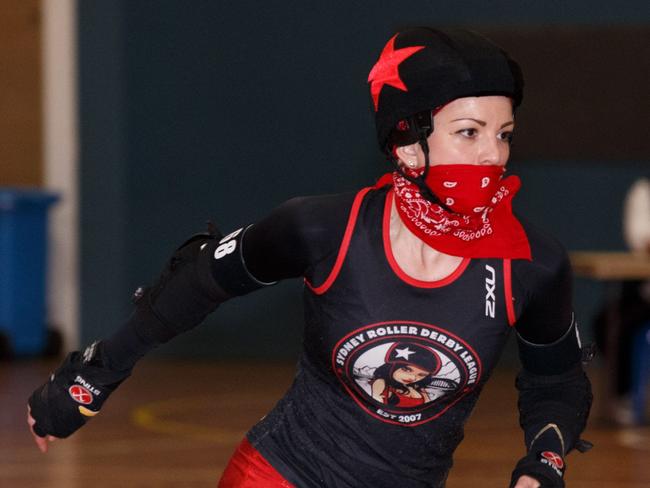
Three days after the big final, McCarthy was sitting at her office desk when everything fell apart.
“I was just sending an email. All of a sudden, my ears started ringing. My body felt really heavy, I felt pain, I felt sick, my fingers were tingling, I couldn‘t hear properly … I headed straight home,” McCarthy said.
“It feels like you are dying, it’s every sense that you have is out of whack. You can’t think straight, you’re not sure if you’re awake or asleep, your memory is off, you feel nauseous, and it got worse from there.”
McCarthy’s memory of the next three months is patchy at best.
“I had a couple of CAT scans, got checked for major brain bleeds, went to a neurologist, went to a few GPs. Everyone just shrugged their shoulders and said sometimes this happens just to give it time” McCarthy recalled.
She also struggled to continue with her usual routine of full time work and training five days per week - symptoms got so bad that she often left the office at lunchtime.
“I remember being on the train just crying, covering my eyes because the light and the sound was too much, not even being able to get home by myself,” McCarthy said.
“Thinking about planning, scheduling, finance and budget, I was completely incapable of doing that with concussion, my brain had completely switched off.”
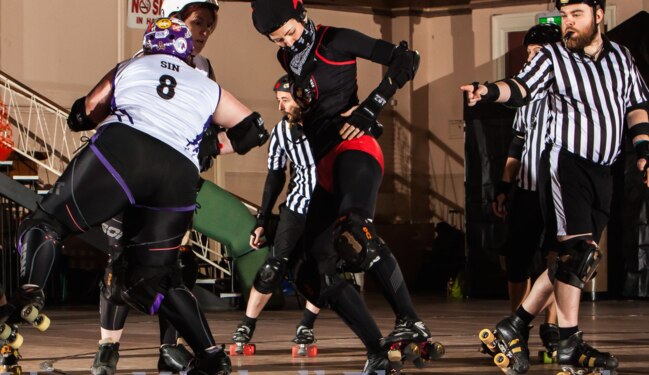
Symptoms worsened over the years and at one point doctors tested McCarthy for Multiple Sclerosis.
“I was having these waking fits, I had to stop everything for nine months, I stopped working and stayed at home” McCarthy said.
Eventually, the jammer was diagnosed with Post Concussion Syndrome (PCS) in 2019 - three years after those big hits.
Today, five years after her concussions, McCarthy still battles torturous symptoms.
“There’s not a day that goes by where I’m not fatigued, in pain or struggling with memory issues or struggling to find the words I need to describe something.
“It’s also impacted my emotional regulation, I find it more difficult to manage when I’m stressed or upset. I now work part time as a result of it.”
“I’ve gotten to a point where I‘ve realised that this is something I’ll have for the rest of my life.”
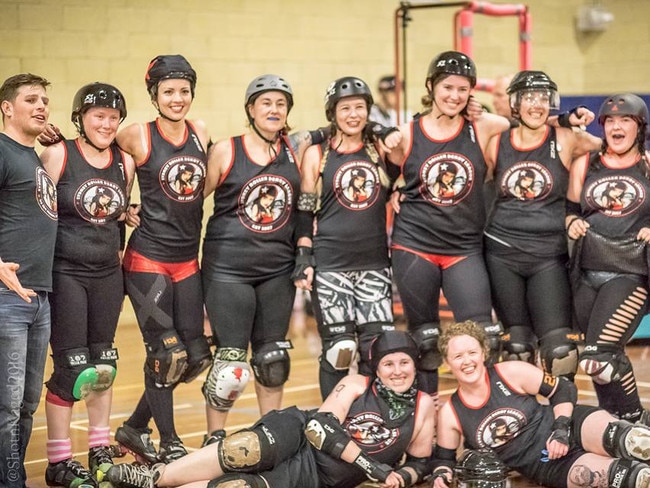
Perhaps the most challenging aspect of PCS for McCarthy was that it forced her out of the sport she’d loved for almost a decade.
“Derby wasn’t just a sport, it was my life, it became my identity. I came out as a queer person because of roller derby. My community was there, I had all of my friends in derby,” McCarthy said.
“It felt like it was taken away and the grief for that was really, really difficult. I still struggle with it, five years later.”
Talking to other roller derby athletes who are battling their own experiences of concussion has helped McCarthy through her injury - but actually finding survivors has been difficult.
“When you get concussed and it lasts for as long as it did, you completely drop out. You drop off the scene, you stop going to social things, you stop going to training. People don’t really see the impact so it‘s difficult to know who’s dealing with it,” McCarthy said.
“I did know a couple of people who had and I reached out to them. It was affirming to hear they’d had similar experiences like trying to do groceries and being so overwhelmed that they had to lay down in the aisle and cry ... it showed that I’m not going crazy.”
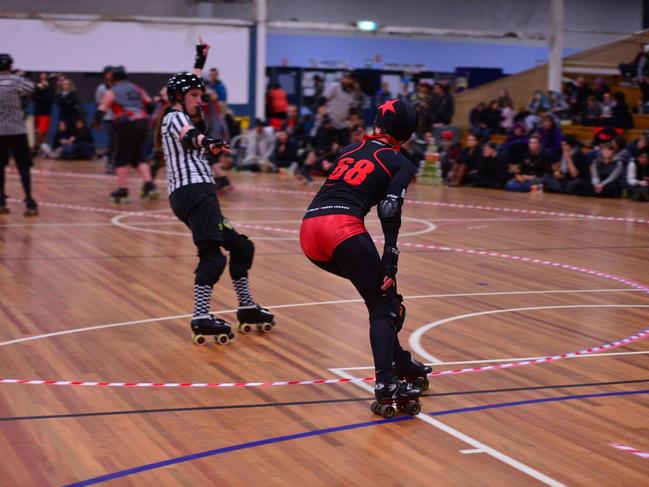
McCarthy is now sharing her story to break the misconception that concussion is an issue exclusive to male athletes and football codes.
She has also called for greater research into concussion and female athletes
“You don’t think it can happen to you, it was part of the discussion around baseline testing, taking adequate time off to repair … but it wasn’t and isn’t recognised for the issue that it is” she said.
McCarthy will feature in Tuesday’s episode of The Feed titled “Female Concussions” airing at 10pm on SBS and SBS On Demand.
Originally published as Maddy Proud opens up on her scary experience with serious concussion


